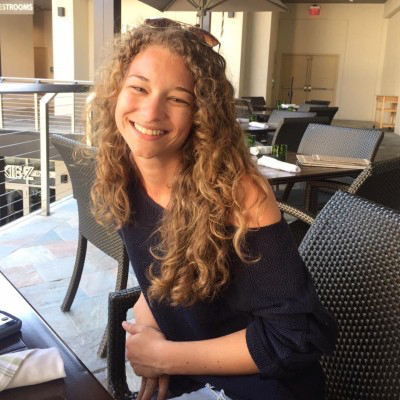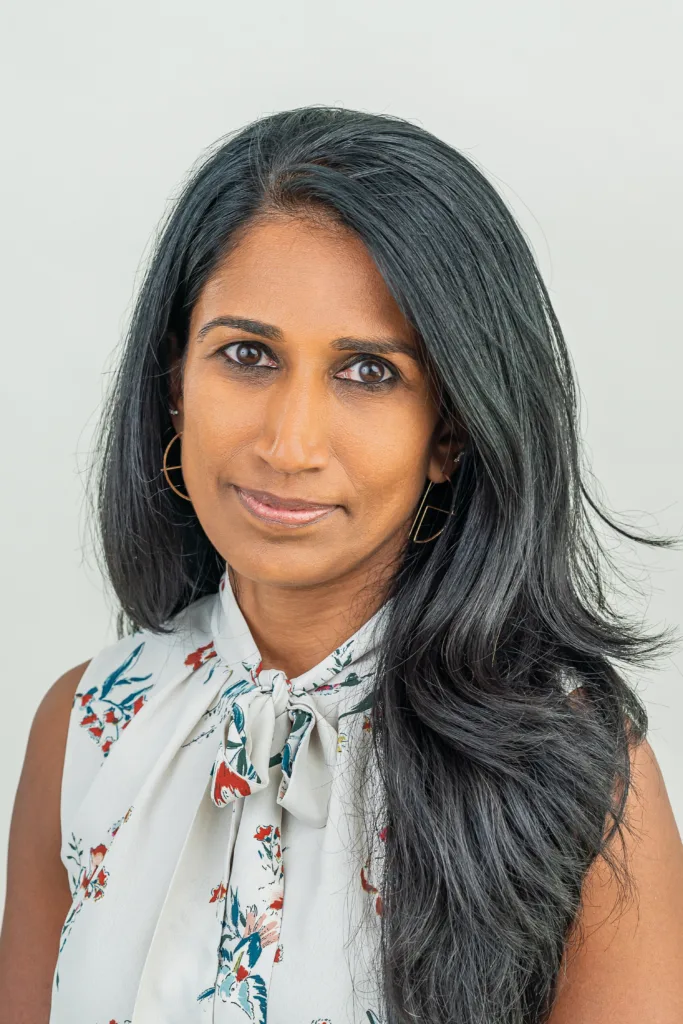If you asked the average person how much they would research before moving across the world or launching a business, they’d likely say weeks or months or years. Sabari Raja is not one of those people.
The startup founder and managing partner at JFFVentures ( an early stage venture fund investing in workforce innovations that drive economic mobility), has spent 20 years in Austin, TX, raising her two sons. But her roots for adventure and spontaneity actually can be traced back to her experiences growing up on a coconut farm in rural India, where her parents still reside. “That’s literally been my foundation for where I am now.”
Despite the fact that her parents never graduated from college, Sabari was always encouraged to excel in school. In fact, to provide access to better education, her parents sent her to boarding school at the tender age of 5.
“I think that was key – it really shaped my personality. It put me in unfamiliar situations to fend for myself,” Sabari explains. “I was also responsible for my younger sister when she joined me. It taught me a lot of responsibilities.”
This is the story of how Sabari’s humble beginnings, relentless drive, and willingness to embrace the unknown propelled her from a farm girl to a founder, investor, and entrepreneur.
Education and Exposure
Sabari’s parents were deeply committed to their children’s education, going far beyond what many parents might do.
Growing up, she says, her father took their lessons and grades very seriously, while understanding his role in helping them reach their full potential. For instance, when Sabari struggled with Hindi, a second language, he took extraordinary steps to support her.
“Nobody spoke Hindi where I’m from, so he signed up to learn Hindi through mail,” she recalls. “He went above and beyond to make sure I didn’t fall behind in my lessons .”
Outside of education, Sabari had limited exposure. “I never really had much social capital growing up. My parents didn’t have that,” she notes. “I went to boarding school, went home, and didn’t travel much.”
Her only glimpse beyond rural India came during visits to her uncle in Bangalore—India’s Silicon Valley.
“I saw how people revered him, and that was something to aspire to,” she says. These experiences fueled her drive to achieve more, despite her limited background.
Sabari chose to stay in India for her initial higher education schooling. But in her final year of engineering school, Sabari found herself asking, “Now what?” Like many peers, she felt stuck in a cycle of uncertainty about the next step.
Then, thanks to friends that pushed her, Sabari saw the possibility in opportunities she never thought to explore, like moving to the U.S.
Real World, New World
Sabari could easily be seen as a free spirit—or, depending on whom you ask, a little impulsive.
“I always feel like all major decisions in my life I’ve taken without thinking too much about what’s next or the consequences,” she admits. “I’d never even traveled past the neighboring state at that point… My first plane ride was actually coming to the U.S.”
Sabari says the full scope of her choice didn’t hit her until she boarded her flight from India to Louisiana.
“Nobody looks like me—that’s when it really hit me, and then I was sitting there by myself crying,” she recalls.
The only other time Sabari recalls being that scared was when she started her first job at Texas Instruments in Dallas.
“I didn’t come from a place of confidence, but there was always this sort of inner drive to do more, do next, go further, lean in,” she says. “I was always leaning in, asking for opportunities despite my fears.”
But Sabari’s drive to succeed was always greater than the challenges set in front of her. This ambition led her to take on an emerging markets role, relocating to Asia for eight months with her two young children—one just eight months old, the other two and a half. Only to return stateside and decide to pursue an MBA, which propelled her career even further.
Launching a Startup: ‘I Don’t Know What I Was Thinking’
While everything was going well at work—visibility, opportunities, leadership track, fresh degree—it wasn’t enough for Sabari. “I decided to leave my job to start a company because—I don’t know what I was thinking.”
This decision probably felt like a massive mistake. Her first company “didn’t go anywhere.” After a year of hard work and no progress, Sabari started to hit a wall.
“I was sort of devastated. I was like, ‘What have I done?’” she recalls. “I had an amazing career path. I left it to do nothing, and I don’t know what I have accomplished in one year.”
Sabari began to question her decision to launch an edtech startup but, with her family’s and husband’s support, persevered. Over the next few months, she reflected on her next steps, feeling stuck in a “funk” and seeing her work as a wasted effort.
A turning point came when she reluctantly attended a STEM education event in Dallas, which planted the seed for her startup, Nepris (now Pathful, Inc.). Motivated by her own lack of social capital and firsthand exposure to educational disparities in rural and underserved areas, Sabari along with her co-founder built a tech firm focused on equity and “future-ready learning.”
“Now that I think back, that was not a wasted year. That was a year of many, many learnings on the ground, which really shaped how I would set up that next company,” she says.
Building Confidence
Sabari has faced challenges head-on, not only surviving but thriving. She sees her own journey reflected in many founders connected to JFFVentures.
“I had a lot of fears. I was never the confident person,” she explains. “I think first is self-awareness—knowing where your gaps are and asking for help.”
For Sabari, seeking help is a strength, and she values founders who embrace vulnerability and guidance.
“I admire and appreciate that more—a level of transparency, honesty, and humility—rather than somebody who’s always putting on a show,” she emphasizes. “The number-one thing I would tell founders: self-awareness, vulnerability, asking for help.”
Sabari emphasizes that transparency is critical, especially in early stages when there’s little else to evaluate. She points to startups that faltered due to ethical lapses, such as manipulating financial data, often rationalized by founders in the moment.
“You’re really investing in the founder, you know, beyond the market or the product or the [growth potential],” she explains. “You really need to get to know the person deeply to understand: Are you a person who, when push comes to shove, is still going to continue to be ethical, honest, and transparent?”

About the Author: Tess Danielson is a journalist and writer focusing on the intersection of technology and society.
Get on our radar for an investment.
Beta Boom invests in founders who don’t fit the traditional Silicon Valley mold.

